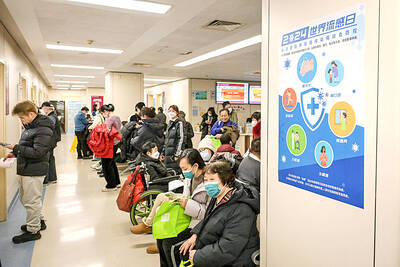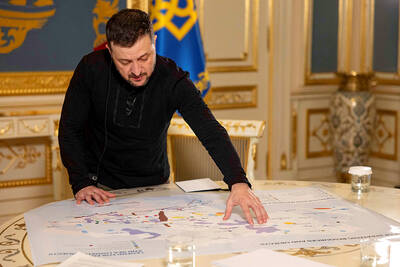A day after saying he hopes to eventually cool tensions with Colombia, Venezuelan President Hugo Chavez charged that his neighbor recently allowed a US military plane to carry out “electronic warfare” operations against Venezuela.
Chavez told a crowd of soldiers on Monday that his US services detected the US aircraft that he said took off from a Colombian base and flew along the border between the two South American nations, which have seen long tense relations worsen in recent months.
Without giving details, he said Venezuela’s military intelligence intercepted a conversation between the pilot and air traffic controllers in the northern Colombian city of Barranquilla.
The aircraft conducted espionage operations, he said.
“Through our strategic intelligence, we detected an RC-12 airplane belonging to the US Air Force,” Chavez said during a talk to an auditorium packed with military officers, rank-and-file soldiers and cadets.
“It was a plane specialized for electronic war, and it was carrying out electronic war operations,” he added.
US Embassy spokeswoman Robin Holzhauer would not directly respond to Chavez’s accusation during a telephone interview on Monday, saying only that “the United States and Colombia engage in a number of bilateral activities,” all of which “respect the sovereignty of other nations.”
No one was immediately available at US Southern Command in Miami to comment.
Chavez has made similar accusations in the past, saying in December last year that a US military plane had entered Venezuelan airspace and was met by his military’s F-16s and escorted out.
The P-3 plane took off from the Dutch Caribbean island of Curacao, he said.
The US Southern Command denied it.
Chavez didn’t elaborate on the alleged spying incident, but the former paratrooper accused Colombia’s government of allowing the US military to use its territory to mount what he called “an aggression” against Venezuela.
Relations between Venezuela and Colombia have been rocky for years, but frictions have intensified recently over Colombia’s agreement to give the US increased access to its military bases — a deal that Chavez calls a threat to his country.
Colombia, meanwhile, accuses Chavez’s government of supporting Colombia’s Marxist rebels. Chavez rejects the allegation.
Chavez’s comments came a few hours after Colombia’s conservative president, Alvaro Uribe, accused the Venezuelan leader of meddling in Colombia’s presidential election campaign by trying to influence the outcome of the vote.
On Sunday, the socialist Chavez said he hoped for improved relations with Colombia’s next president, but warned that efforts to reduce tensions would face serious obstacles if Uribe’s ally — former defense minister Juan Manuel Santos — wins the May 30 election.
Chavez, who has repeatedly clashed with Uribe and Santos, also said Colombia’s government could become a threat to its neighbors if Santos was elected.
Uribe accused Chavez of trying to “intimidate” Colombians by warning that a Santos victory could lead to armed conflict. “The Colombian people are not going to accept this blackmail,” said Uribe, whose term ends on Aug. 7.
Santos is among the favorites to win Colombia’s presidential election.
After lambasting Santos on Sunday, Chavez denied he is trying to influence the outcome of the vote.

Thousands gathered across New Zealand yesterday to celebrate the signing of the country’s founding document and some called for an end to government policies that critics say erode the rights promised to the indigenous Maori population. As the sun rose on the dawn service at Waitangi where the Treaty of Waitangi was first signed between the British Crown and Maori chiefs in 1840, some community leaders called on the government to honor promises made 185 years ago. The call was repeated at peaceful rallies that drew several hundred people later in the day. “This government is attacking tangata whenua [indigenous people] on all

RIGHTS FEARS: A protester said Beijing would use the embassy to catch and send Hong Kongers to China, while a lawmaker said Chinese agents had threatened Britons Hundreds of demonstrators on Saturday protested at a site earmarked for Beijing’s controversial new embassy in London over human rights and security concerns. The new embassy — if approved by the British government — would be the “biggest Chinese embassy in Europe,” one lawmaker said earlier. Protester Iona Boswell, a 40-year-old social worker, said there was “no need for a mega embassy here” and that she believed it would be used to facilitate the “harassment of dissidents.” China has for several years been trying to relocate its embassy, currently in the British capital’s upmarket Marylebone district, to the sprawling historic site in the

A deluge of disinformation about a virus called hMPV is stoking anti-China sentiment across Asia and spurring unfounded concerns of renewed lockdowns, despite experts dismissing comparisons with the COVID-19 pandemic five years ago. Agence France-Presse’s fact-checkers have debunked a slew of social media posts about the usually non-fatal respiratory disease human metapneumovirus after cases rose in China. Many of these posts claimed that people were dying and that a national emergency had been declared. Garnering tens of thousands of views, some posts recycled old footage from China’s draconian lockdowns during the COVID-19 pandemic, which originated in the country in late

BACK TO BATTLE: North Korean soldiers have returned to the front lines in Russia’s Kursk region after earlier reports that Moscow had withdrawn them following heavy losses Ukrainian President Volodymyr Zelenskiy on Friday pored over a once-classified map of vast deposits of rare earths and other critical minerals as part of a push to appeal to US President Donald Trump’s penchant for a deal. The US president, whose administration is pressing for a rapid end to Ukraine’s war with Russia, on Monday said he wanted Ukraine to supply the US with rare earths and other minerals in return for financially supporting its war effort. “If we are talking about a deal, then let’s do a deal, we are only for it,” Zelenskiy said, emphasizing Ukraine’s need for security guarantees